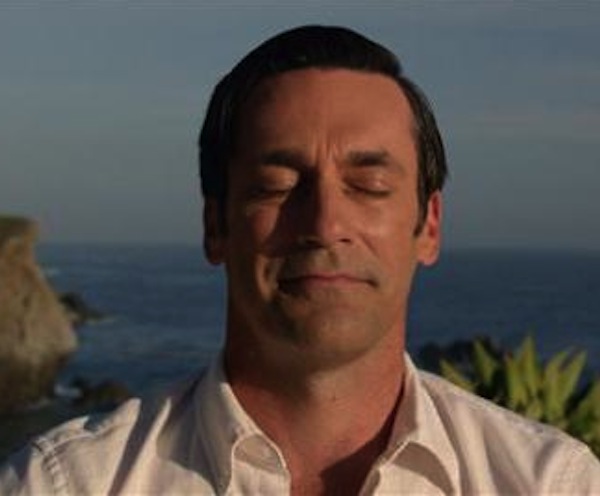Television Review: “Mad Men” – Reflections on the Finale
The revolution may be televised, but it is also going to be packaged and sold back to us.

Jon Hamm as Don Draper at the end of “Mad Men.” Experiencing the peace that passeth understanding? Photo: Courtesy of AMC.
By Tim Jackson
The salesman, the PR man, and the ad-man mirror the inevitable conflicts of a free enterprise system in which the power of identity revolves around buying and selling both things and personalities. The gifted traveling salesman who sells his soul and the slick ad-man who markets our dreams and desires have become venerable American archetypes. When Arthur Miller’s Willy Loman is no longer “well liked” he becomes despondent; Paul “The Badger” Brennan in Albert and David Maysles’ classic documentary Salesman becomes angst-ridden in the face of failure. In 1947’s MGM film The Hucksters, Sydney Greenstreet as the barbaric head of a soap company lets loose a gob of phlegm as he lectures ad-man Clark Gable about the horrors of advertising. The opening minutes of John Cassavetes’ 1968 film Faces features a cynical advertising sales meeting where the women are at the beck and call of arrogant men. The smarmiest of them all is a weasel ironically named Fred Draper (played by the actor Fred Draper).
Add to this memorable list of American slick operators Don Draper. In the brilliant finale of Mad Men, he makes it through a painful crisis of identity. He sits cross-legged looking over the Pacific with a Cheshire grin, blissing out to the sound of “OM.” Has he come to understand that anger and ignorance breed misery, and that wisdom will only come through suffering? Or is he about to devise an ad that will co-opt an entire culture and become one of the greatest campaigns of all time? That is the wonderful irony generated by Mad Men’s conclusion. The revolution may be televised, but it is also going to be packaged and sold back to us.
Don Draper may triumph, but so do the show’s women. Despite its title, Mad Men has always been about their journey, and it turns out the females end up succeeding in more nuanced ways than the men. It is a huge relief for viewers that Peggy Olson finds love, albeit sudden and melodramatic. Joan Harris’s rise to power is well deserved. Pete and Trudy Campbell force us to acknowledge the future: the arrival of Reagan-era greed and entitlement. The oft-tested Betty Draper, who devoted herself to children and home, as did many women of the era, comes across with strength and dignity.

Stephanie Drake’s Meredith speaks the truth in the final episode of “Mad Men.” Photo: Courtesy of AMC.
My own mother, an artist and feminist at heart, raised three kids, smoked for 60 years, and died of cancer. Like Betty, and many others of that era, her potential was never fully realized. My father was also a salesman, not traveling door-to-door selling Bibles or vacuum cleaners but repping agricultural machinery around the eastern states for Farm Implement News. He was from a poor family in Brooklyn and never graduated high school, but through correspondence classes and a sparkling personality attained middle-class status in Westport, Connecticut. I suspect many of us harbor that kind of scrappy, Draper-esque power of reinvention. As David Letterman said about his career in an interview with Jane Pauley, he was “waiting to be tapped on the shoulder: ‘Okay, the real guy’s here. You can go home now.’” My dad was downsized at the age of 50.
Adult responsibility finds its way to Kiernan Shipka’s Sally Draper. Children of divorce and distant fathers, these women are now in their 50s and 60s. There’s optimism in the 180 degree turn Sally takes away from her troubled parents. The attitude of Draper’s leveled-headed secretary Meredith, played with ingenuous charm by Stephanie Drake, neatly evokes the show’s humor and insight. At the beginning of the final episode Meredith makes a comment about the missing Don Draper to Roger Sterling (John Slattery): “Well, I hope he’s gone to a better place.” Sterling replies that “he’s not dead. Stop saying that!” She retorts: “Well. There are lots of better places than here.” He’s left speechless.
Tim Jackson is an assistant professor at the New England Institute of Art in the Digital Film and Video Department. His music career in Boston began in the 1970s and includes some 20 groups, many recordings, national and international tours, and contributions to film soundtracks. He studied theater and English as an undergraduate and has also has worked helter skelter as an actor and member of SAG and AFTRA since the 1980s. He has directed a trio of documentaries: Chaos and Order: Making American Theater about the American Repertory Theater, and Radical Jesters, which profiles the practices of 11 interventionist artists and agit-prop performance groups. His third documentary, When Things Go Wrong, about the Boston singer/songwriter Robin Lane, with whom he has worked for 30 years, has just been completed. He is a member of the Boston Society of Film Critics. You can read more of his work on his blog.
